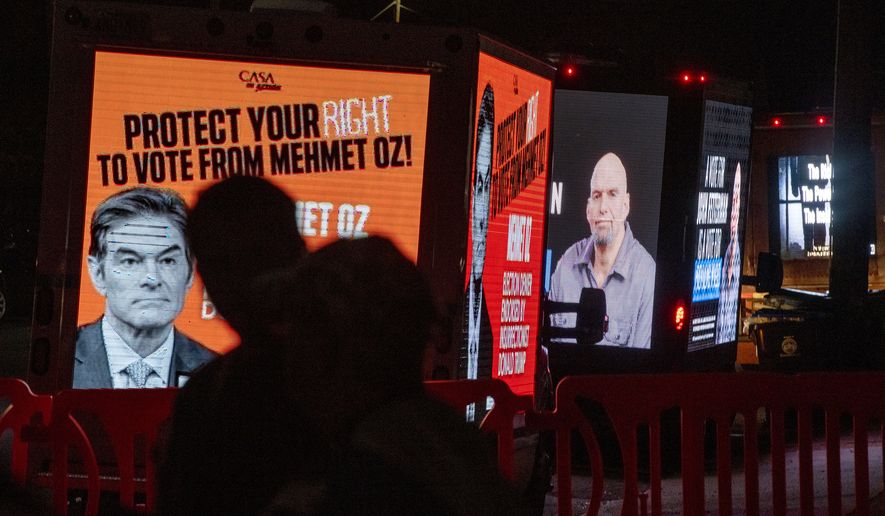You haven’t heard much about them in all the midterm election coverage, but third-party and independent candidates in several states have picked up enough support to influence the outcomes of some of the nation’s closest Senate races.
In Georgia’s Senate race, Libertarian Party candidate Chase Oliver pulled in 4.6% of the vote in a Trafalgar/Daily Wire poll released this week. Mr. Oliver’s pool of support is significant enough to force the two leading candidates, Republican Herschel Walker and Democratic incumbent Raphael Warnock, into a December runoff if neither candidate wins more than 50% of the vote on Nov. 8.
In the vast majority of polls that include Mr. Oliver, neither Mr. Warnock nor Mr. Walker has earned enough support to avert a runoff, and the race is so close that it is considered a toss-up.
“Neither candidate is likely to hit 50% under that scenario,” said Erin Covey, an analyst for the nonpartisan Inside Elections.
Nevada’s midterm ballot gives voters several choices that could determine which of the two leading candidates wins the Senate seat.
In addition to incumbent Democrat Catherine Cortez Masto and Republican challenger Adam Laxalt, Libertarian Neil Scott and independent candidate Barry Lindemann are on the ballot. Voters also have an extra choice: “None of these candidates,” a nonbinding option that could draw away thousands of dissatisfied voters from the front-runners. All those options could tip the outcome of the race, which is considered a toss-up between Ms. Cortez Masto and Mr. Laxalt.
In Pennsylvania, where Democrat John Fetterman leads by about 1 percentage point over Republican Mehmet Oz, three other candidates on the ballot are drawing a small fraction of support that could influence the outcome, Suffolk University polling director David Paleologos told The Washington Times.
With early voting underway in Pennsylvania, Mr. Fetterman’s disastrous debate performance this week may send voters who don’t like Mr. Oz looking for another alternative out of concern for Mr. Fetterman’s lingering health problems after a near-fatal stroke in May.
“I don’t care if that candidate gets half of a percent of the vote,” Mr. Paleologos said. “That might be the half that Fetterman wins or loses by.”
Arizona’s ballot will list incumbent Democrat Mark Kelly, Republican challenger Blake Masters and Libertarian Marc Victor. A recent Trafalgar/Daily Wire poll of likely voters shows Mr. Kelly leading Mr. Masters by a single point. Mr. Victor picked up 2.7% of the vote.
Mr. Paleologos thinks the third-party choice is drawing votes away from Mr. Masters.
“Let’s say voters are upset at Biden in Arizona, and they’re upset about the economy and they’re not voting for Kelly,” he said. “But they may disagree with Masters on [abortion] and whatever stance he takes on that. Now they have an outlet. That’s a vote that would go to Masters, probably.”
It wouldn’t be the first time a third-party candidate has swayed the outcome of an election.
Democrats blame Green Party candidate Ralph Nader for siphoning away tens of thousands of Florida votes from Al Gore in the 2000 presidential election, helping George W. Bush win the state and secure enough electoral votes to claim the presidency.
Eight years earlier, independent candidate Ross Perot won nearly 20 million votes, or nearly 19% of the popular vote. Bill Clinton defeated President George H.W. Bush by a margin of 43% to 37%. Polling at the time showed Mr. Perot attracting both Democratic and Republican voters, but he has long been blamed for costing Mr. Bush a second term.
In Georgia’s tight Senate race, Mr. Oliver, the Libertarian candidate, said his candidacy is not to blame for forcing Mr. Walker and Mr. Warnock into a runoff.
“I feel like the two parties are getting more and more hyperpartisan and further away from where the average voter is,” Mr. Oliver told The Times. “And I think we need to have someone on the ballot who is working for the voter and not just for their preferred political party.”
Mr. Oliver was not on the stage in Savannah when Mr. Walker faced off with Mr. Warnock in their only debate, but he participated in a televised debate with Mr. Warnock a few days later, boosting his name recognition with voters.
If neither Mr. Warnock nor Mr. Walker wins more than 50%, triggering a runoff, it’s their own fault, Mr. Oliver said.
“That’s a signal that they need to be far more responsive to the voters or that we need more choices in the discourse,” Mr. Oliver said.
Many Senate races also include write-in candidates who do not appear on the ballot but in some cases are picking up significant support.
On Tuesday, hours before Mr. Fetterman and Mr. Oz walked onto the debate stage, write-in Senate candidate Everett Stern, an independent, announced he was dropping out of the Pennsylvania race and backing Mr. Fetterman.
A Fox News poll in late September showed Mr. Stern polling at 3%.
“I am polling around 3% which places Democracy at risk,” Mr. Stern announced on Twitter. “In the interest of protecting the United States, I am dropping out of the U.S. Senate Race in PA. I fully endorse John Fetterman. The Democrats must win. PA must be Blue. It has been an honor running.”
• Susan Ferrechio can be reached at sferrechio@washingtontimes.com.





Please read our comment policy before commenting.